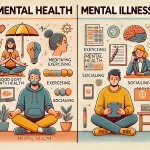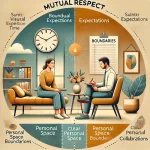Common Mental Health Myths Debunked: The South African Context
Mental health remains a highly misunderstood topic in South Africa, with many people still believing outdated myths about therapy, mental illness, and psychology. These misconceptions prevent people from seeking help, contribute to stigma, and create unnecessary barriers to treatment.
This post will debunk common mental health myths and explain why they are especially relevant in the South African context.
🚫 Myth #1: “Mental illness is just a Western concept.”
✅ Reality: Mental health challenges exist in every culture and community—including South Africa.
- Conditions like depression, anxiety, and schizophrenia affect people regardless of race, background, or socioeconomic status.
- In many African cultures, mental illness has historically been linked to spiritual beliefs, leading to stigma and avoidance of professional care.
- The South African Stress and Health (SASH) study found that 75% of people with mental health conditions do not receive treatment—often due to stigma and lack of awareness.
💡 Key takeaway: Mental illness is real and affects all communities in South Africa, not just Western societies.
🚫 Myth #2: “Seeing a psychologist means you’re weak or ‘crazy’.”
✅ Reality: In South Africa, mental health stigma is one of the biggest reasons people avoid seeking help.
- Many people still associate therapy with being “mad” or “unstable,” which discourages individuals from prioritizing their mental well-being.
- The truth is, therapy helps everyday people manage stress, grief, work pressure, trauma, and relationship challenges.
- Therapy is as important as seeing a doctor when you’re physically unwell—it’s about taking care of your emotional and psychological well-being.
💡 Key takeaway: Seeking therapy is a sign of strength, not weakness. It takes courage to work on yourself and seek help when needed.
🚫 Myth #3: “Mental illness is just stress—people must toughen up.”
✅ Reality: While stress is a normal part of life, mental illness is not just about feeling overwhelmed—it involves biological, genetic, and environmental factors.
- Conditions like depression, bipolar disorder, and PTSD cannot be solved by simply “toughening up.”
- Many South Africans, especially men, are expected to be “strong” and not talk about emotions, leading to high rates of untreated mental illness and even suicide.
- Suicide rates in South Africa are alarmingly high, particularly among men—highlighting the need for better mental health awareness and support.
💡 Key takeaway: Mental illness is not a lack of strength—it’s a real medical condition that requires professional care.
🚫 Myth #4: “You only need therapy if you have a serious mental illness.”
✅ Reality: Therapy isn’t just for those with severe conditions—it’s for anyone struggling with emotional or psychological challenges.
- Many people in South Africa deal with workplace stress, family conflicts, grief, and trauma, which therapy can help with.
- Trauma is especially relevant in South Africa, where many people have experienced crime, violence, or childhood adversity.
- Therapy can be preventative, helping people manage stress before it leads to bigger problems.
💡 Key takeaway: You don’t need a diagnosis to benefit from therapy. Mental health support is for everyone.
🚫 Myth #5: “Traditional healers are better than psychologists.”
✅ Reality: In South Africa, many people trust traditional healers (sangomas and inyangas) over medical professionals when it comes to mental health issues.
- Traditional healing is an important part of African culture, but it does not replace the role of psychologists and psychiatrists.
- The Department of Health has recognized the need for integrating traditional healing and modern mental health care—encouraging both to work together.
- A psychologist uses scientifically tested methods to help people manage trauma, anxiety, and depression—complementing cultural beliefs rather than opposing them.
💡 Key takeaway: Traditional healing and psychology can co-exist, but for mental health disorders, professional therapy and treatment are essential.
🚫 Myth #6: “Medication for mental illness is unnecessary and addictive.”
✅ Reality: Psychiatric medication can be life-changing for those who need it, but it is not always necessary for everyone.
- In South Africa, many people fear medication due to misinformation and stigma.
- Psychiatrists carefully assess whether medication is necessary, and most mental health conditions can be managed with therapy alone or a combination of therapy and medication.
- Medications like antidepressants, mood stabilizers, and anxiety treatments are safe when used correctly under medical supervision.
💡 Key takeaway: Medication is a tool, not a crutch. When prescribed responsibly, it helps people regain control of their lives.
🚫 Myth #7: “Mental health isn’t a priority in South Africa.”
✅ Reality: While mental health has been overlooked in South Africa, awareness is growing.
- South Africa has a serious mental health crisis, with high rates of trauma, violence, and stress-related disorders.
- Government initiatives like the National Mental Health Policy Framework aim to improve access to psychological services.
- More South Africans are speaking up about mental health, reducing stigma and encouraging more people to seek help.
💡 Key takeaway: Mental health is just as important as physical health, and South Africa is making progress in recognizing this.
Why Challenging These Myths Matters
Many South Africans avoid therapy or delay seeking help because of these myths. The more we educate ourselves and others, the more we can normalize mental health conversations and break the stigma.
✅ Mental health is real and important.
✅ Seeking help is a sign of strength, not weakness.
✅ Therapy is for everyone, not just those with a diagnosis.
If you or someone you know is struggling, professional support is available.
Final Thoughts
Mental health myths hold people back from getting the help they need. The more we challenge these misconceptions, the more people will feel comfortable prioritizing their mental well-being.
If you’re ready to take the next step in understanding and improving your mental health, book a consultation today.




